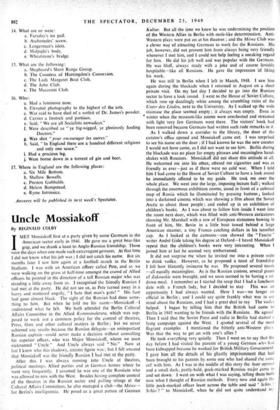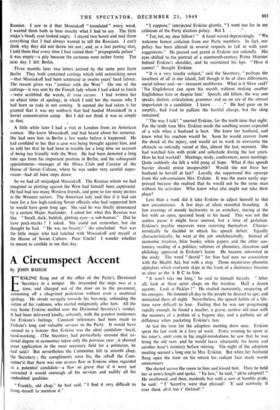Uncle Mossiakoff
By REGINALD COLBY
IMET Mossiakoff first at a party given by some Germans in the American sector early in 1946. He gave me a great bear-like grip, and we drank a toast to Anglo-Russian friendship. Those were the days when one made such extravagant gestures. At that time I did not know what his job was ; I did not catch his name. But six months later I saw him again at a football match in the Berlin Stadium. I was with an American officer called Pete, and as we were walking on the grass at half-time amongst the crowd of Allied officers he pointed in the direction of a tall Russian major who was standing a little away from us. I recognised the friendly Russian I had met at the party. He did not see us, as Pete turned away in a hurry and muttered angrily, " I hate that man's guts! " His face had gone almost black. The sight of the Russian had done some- thing to. him. But when he told me his name—Mossiakoff-1 understood what he felt. We both attended the Berlin Cultural Affairs Committee in the Allied Konunandatura, which was sup- posed to work out a common policy for the control of theatres, Press, films and other cultural matters in Berlin ; but we never achieved any results because the Russian delegate—an unimportant Russian captain—could never make a decision without consulting his superior officer, who was Major Mossiakoff, whom we soon nicknamed " Uncle." And Uncle always said " No." Now at last I knew who this shadowy, sinister figure was ; but I felt amazed that Mossiakoff was the friendly Russian I had met at the party.
After this I was always running into Uncle at theatres, political meetings, Allied parties and at German homes where he went very frequently. I assumed he was one of the Russians who was allowed to mix with the West. Besides having complete control of the theatres in the Russian sector and pulling strings at the Cultural Affairs Committees, he also managed a club—the Miiwe- for Berlin's intelligentsia. He posed as a great patron of German Kultur. But all the time we knew he was undermining the position of the Western Allies in Berlin with mole-like determination. Anti- Western plays were put on at his theatres ; and the Miiwe Club was
a clever way of attracting Germans to work for the Russians. His job, however, did not prevent him from always being very friendly whenever I met him, and I could not help feeling a sneaking regard for him. He did his job well and was popular with the Germans. He was bluff, always ready with a joke and of course lavishly hospitable—like all Russians. He gave the impression of liking his work.
He was still in Berlin when I left in March, 1948. I saw him again during the blockade when 1 returned in August on a short private visit. On my last day I decided to go into the Russian sector to have a to round. I went to the House of Soviet Culture,
which rose up dazzlingly white among the crumbling ruins of the Unter den Linden, next to the University. As I walked up the wide staircase the place seemed empty ; it always was empty. Even in
• winter when the museum-like rooms were overheated and streamed with light very few Germans went there. The visitors' book had been removed because Germans had written such rude remarks in it.
As I walked down a corridor to the library, the door of the curator's office opened and Mossiakoff came out. I was surprised to see his name on the door ; if I had known he was the new curator I would not have come, as I did not want to see him. Berlin during the blockade was no place for empty phrases and meaningless hand- shakes with Russians. Mossiakoff did not share this attitude at all. He welcomed me into his office, offered me cigarettes and was as friendly as ever—just as if there were no cold war. When I told him I had come to the House of Soviet Culture to have a look round he immediately offered to be my guide. He took me over the whole place. We went into the large, imposing lecture ball ; walked through the enormous exhibition rooms; stood in front of a colossal map of Russia which he illuminated by pressing buttons; looked into a darkened cinema which was showing a film about the Soviet Arctic to about three people ; and ended up in an exhibition of children's books. As I was about to follow him inside 1 went into the room next door, which was filled with anti-Western caricatures showing Mr. Marshall with a row of European statesmen bowing in front of him, Mr. Bevin in a little boat towed behind a large American steamer, a tiny Franco catching dollars in his tasselled cap. As 1 looked at the cartoons—one showed the " Fascist " writer Andre Gide taking his degree at Oxford-1 heard Mossiakoff repeat that the children's books were very interesting. When I joined him at last he seemed very embarrassed.
It did not surprise me when he invited me into a private suite to drink vodka. However, as he proposed a toast of friendship I felt how blatantly insincere he was. He proposed several toasts —all equally meaningless. As is the Russian custom, several plates of Zakouskie were brought, and we soon seemed to be having a sit- down meal. I remember as I started the soup that I had a luncheon
date with a French lady, but I decided to stay This was an opportunity I had always wanted. Here I was—no longer an official in Berlin ; and 1 could say quite frankly what was in illy mind about the Russians, and I had a great deal to say The vodk.i helped. I began by telling him that the British had come to Berlin in 1945 wanting to be friends with the Russians. He agreed Then 1 said that the Soviet Press and radio in Berlin had started a lying campaign against the West. I quoted several of the most flagrant examples I mentioned the bitterly anti-Western plays Was that the way to get on with one's allies ?
He took everything very quietly. Then I went on to say that the day before I had visited the parents of a young German who had been kidnapped because he worked for British. Military Government.
I gave him all the details of his ghastly imprisonment that had been brought to his parents by some one who had shared the same cel! with him. As 1 was in the middle of this story the door opened and a small dark, partly-bald, pock-marked Russian major came in and sat down. I went on with what I was saying, telling them both
now what I thought of Russian methods. Every now and again the little pock-marked officer leant across the table and said ' Schto? Schto? " to Mossiakoff, when he did not quite understand my Russian. 1 saw to it that Mossiakoff " translated " every word. I wanted them both to hear exactly what I had to say. The little major's beady eyes looked angry_ I stayed two hours and told them everything that 1 had always wanted to tell the Russians. I can't think why they did not throw me out ; and, as a last parting shot, I told them that every time I had visited their " propaganda palace " it was empty—a pity because the cartoons were rather funny The next day I left Berlin.
Three months later two letters arrived by the same post from Berlin They both contained cuttings which told astonishing news —that Mossiakoff had been sentenced to twelve years' hard labour. Me reason given was "contact with the West." On one of the cuttings—it was sent by the French lady whom I had asked to lunch —were scribbled the words, Je vous excuse. I had written her an abject letter of apology, in which I told her the reason why I had been so rude in not coming. It seemed she had taken it for granted that it was my outburst that had landed Mossiakoff in a Soviet concentration camp. But I did not think it was as simple as that.
A little while later I had a visit in London from an American woman. She-knew Mossiakoff, and had heard about his sentence. She had seen him in Berlin a few weeks before it happened. He had confided to her that a case was being brought against him, and he told her that he had been in trouble for a long time on account of being too friendly with the West. He had been demoted a long time ago from his important position in Berlin, and his subsequent appointments—manager of the Mowe Club and Curator of the House of Soviet Culture, where he was under very careful super- vision--had all been steps down.
So we had all misjudged Mossiakoff. The Russian whom we had imagined as plotting against the West had himself been captivated. He had had too many Western friends, and gone to too many parties in the Western sectors. The American lady said that if it had not been for a few high-ranking Soviet officials who had supported him he would have gone long ago. She said he was finally denounced by a certain Major Auslander. I asked her what this Russian was like. "Small, dark, baldish, glinting eyes—a sub-human." Did he have pock-marks ? I asked. She could not remember, but she thought he had. " He was no beauty! " she concluded. Nor was the little major who had lunched with Mossiakoff and myself at the House of Soviet Culture. Poor Uncle! I wonder whether he meant to confide in me that day.



































 Previous page
Previous page